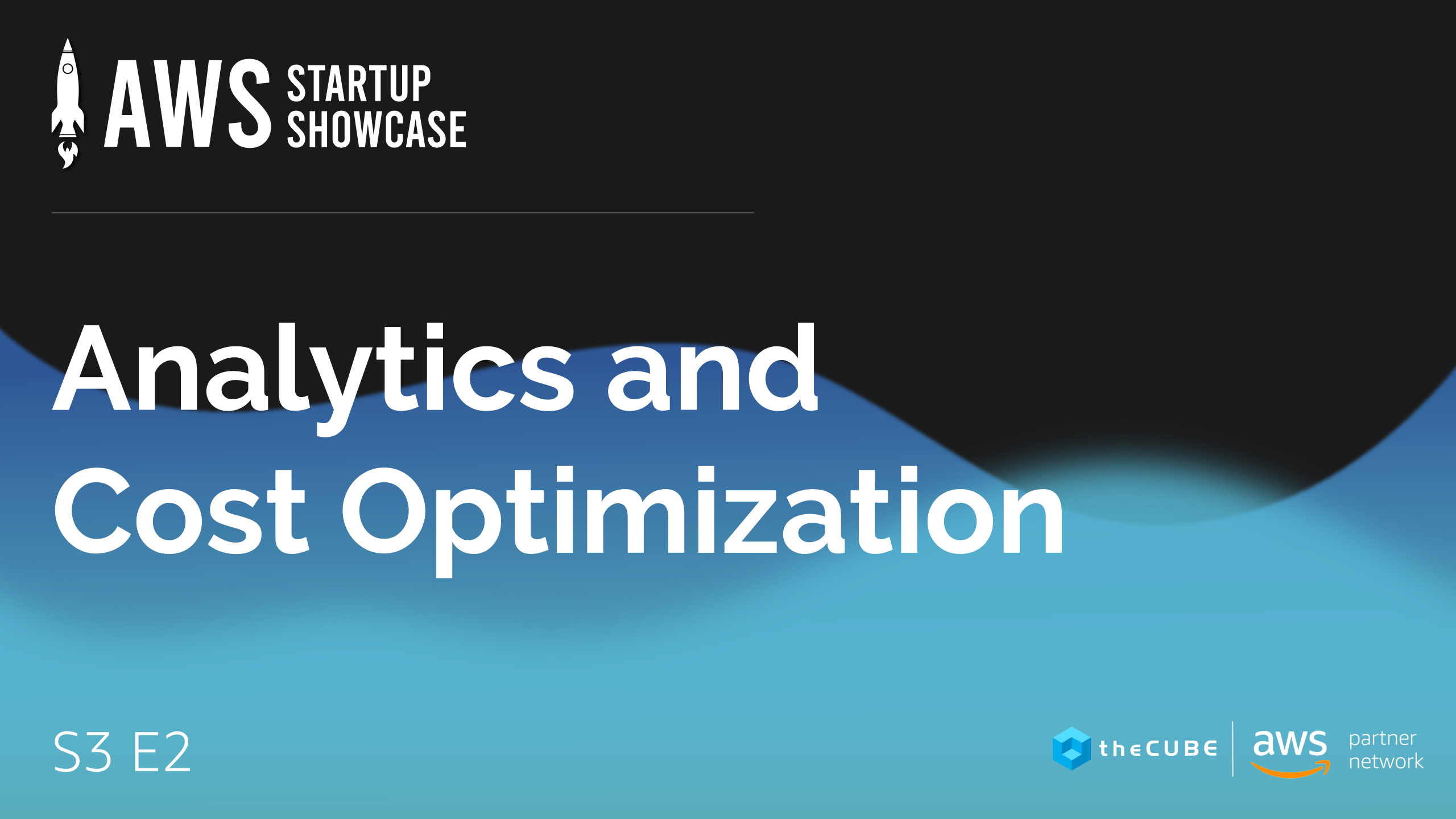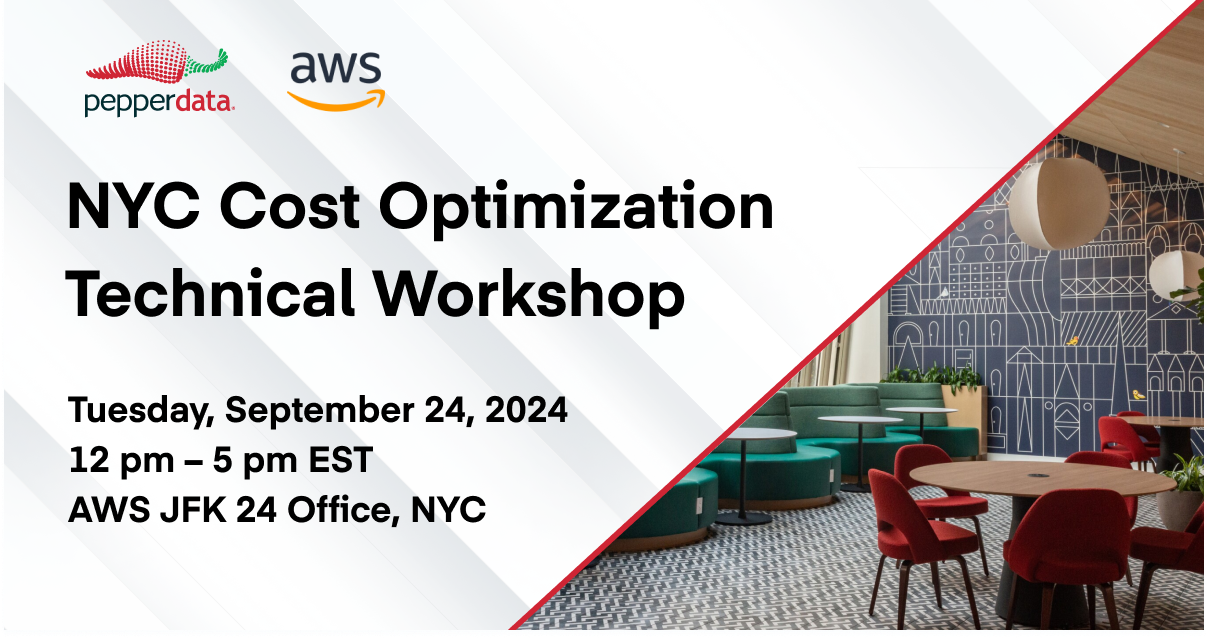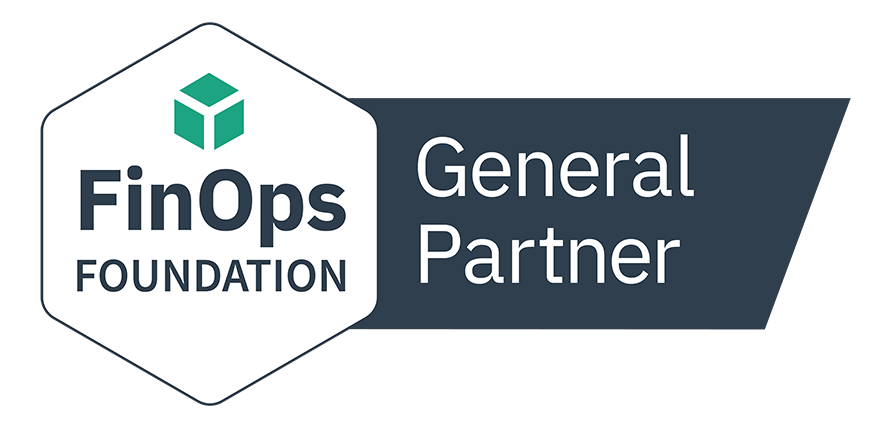Past Events
Technical Workshop with AWS and Pepperdata
Tuesday, September 24th, 2024
12:00 pm – 5:00 pm ET
AWS and Pepperdata are hosting a hands-on Amazon EMR cost optimization lab in NYC to show the “before and after” savings with Pepperdata alongside a free lunch!
Experience how you can autonomously reduce resource overprovisioning and instance hours costs by 30-47%.
AWS Summit New York

July 10, 2024: 8:00 – 6:00 p.m. EST
Pepperdata will be at the AWS Summit New York at Kiosk #939 to showcase how our real-time cost optimization solution saves between 30-47% for customers running large-scale, data-intensive workloads on Amazon EMR and EKS.
Come chat with our VP of Sales Dan Marx, Senior Solutions Architect Kirk Lewis, and the entire Pepperdata team to see how Pepperdata works and explore how much you can save.
Find us in the Exhibitor Pavilion at Kiosk #939 across from the Summit Espresso Station.
AWS Cloud Finance Onboarding - June Edition

June 12, 2024: 4:00 – 8:30 p.m. PST
AWS is hosting the Cloud Finance Onboarding (CFO)—a free-of-charge, 2-half-day webinar series focused on FinOps essentials like cloud spend and cloud cost optimization.
Pepperdata Senior Solutions Architect Kirk Lewis is presenting “Real-Time Cost Optimization: Reduce the Cost of Data-Intensive Workloads on AWS with Pepperdata,” from 08:00 – 08:30 a.m. PDT.
Learn how you can immediately and automatically save 30% on your cloud bill in real time with no manual tuning, no recommendations, and no application code changes.
Amazon EMR on Amazon EKS Builders Workshop
Amazon (AUS13), 11601 Alterra Parkway, Austin, TX 78758

Kubernetes has emerged as a popular platform to run data workloads due to improved agility, scalability, and portability. It provides a unified environment for managing both stateful and stateless applications, making it easier to run a wide range of data workloads, including frameworks such as Spark and fully-managed big data processing services such as Amazon EMR.
Join Pepperdata at this AWS Builders Workshop on Amazon EMR on EKS Builders Workshop to learn:
- How Kubernetes simplifies infrastructure management
- How Amazon EMR on EKS can reduce cost and optimize performance for big data workloads—with special presentations by Pepperdata and customer Autodesk
- Best Practices for implementing Amazon EMR on EKS inclusive of blueprints for accelerating time to value
Who should attend
This event is for cloud professionals interested in gaining hands-on experience in EMR on EKS with a view to reducing costs and simplifying infrastructure management.
KubeCon + CloudNativeCon North America
Chicago, IL, Nov. 6-9, 2023
Pepperdata will showcase it’s battle-tested cloud cost optimization solution—Capacity Optimizer—at a KubeCon booth. Attendees will be able to learn:
- How Pepperdata optimizes cloud resources for both batch and microservices
- How Capacity Optimizer eliminates the need for manual tuning and recommendations
- How Pepperdata can save you between 10-25% in Kubernetes costs
Register for the event to meet with our solutions team in person and watch a live demo.
AWS Startup Showcase:
Analytics and Cost Optimization
June 8, 2023
10 a.m. PST/1 p.m. EST

The Analytics and Cost Optimization Startup Showcase, sponsored by AWS and theCUBE, is hosting eight dynamic startups including Pepperdata to highlight cutting-edge insights from topics such as infrastructure automation and cloud cost optimization.
In an interview from 11:20–11:40 a.m. PST, Pepperdata CEO Ash Munshi will cover:
- Why Cost Optimization has become an imperative in today’s market
- Why manual tuning to achieve Cost Optimization is a losing battle
- How Pepperdata offers the only real-time, automated solution to continuously keep your cloud spend on Amazon EMR and Amazon EKS in its optimal spot
After Ash’s interview, Pepperdata Senior Solution Architect Kirk Lewis will give a brief demonstration of how Capacity Optimizer automatically optimizes resource utilization and cloud costs continuously in real time.
Data Stack Summit:
(Virtual) April 19, 2023
 What is Data Stack Summit?
What is Data Stack Summit?
Finding ways to efficiently conquer the modern data stack can become infinitely more possible when we’re able to gather together collaboratively as a community and discuss the tools and capabilities desired by future-forward organizations.
Hear real-world perspectives from long-time enterprise data visionaries, data engineers, data and cloud architects, DataOps and DevOps practitioners as they talk through topics like the building blocks of the modern data platform, open source considerations, best practices for enterprise data operations, migrations, data observability, and tuning data pipelines for performance at scale.


 What is Data Stack Summit?
What is Data Stack Summit?

